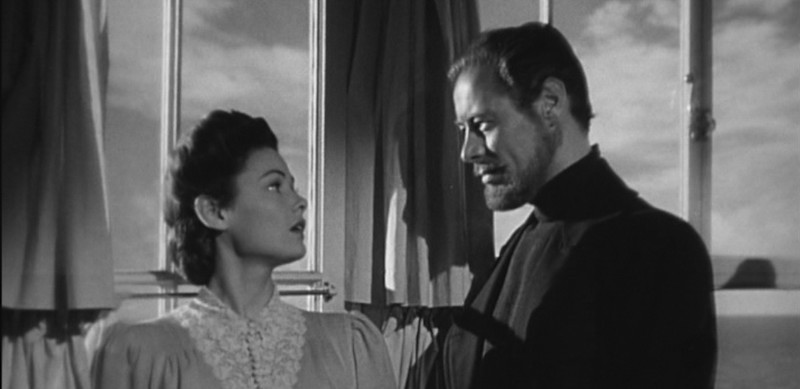 In The Devil is a Woman Marlene Dietrich’s eyes are constantly moving: searching, darting, batting flirtatiously. By their fifth and final film collaboration, Dietrich and director Joseph von Sternberg had perfected the formula for exotic, onscreen seduction: just keep the camera on Dietrich. As Concha Perez, an enterprising destroyer of men’s souls, Dietrich is as alluring and deadly as any black widow spider. Can she help it if every man in the movie is so utterly powerless against her charms?
In The Devil is a Woman Marlene Dietrich’s eyes are constantly moving: searching, darting, batting flirtatiously. By their fifth and final film collaboration, Dietrich and director Joseph von Sternberg had perfected the formula for exotic, onscreen seduction: just keep the camera on Dietrich. As Concha Perez, an enterprising destroyer of men’s souls, Dietrich is as alluring and deadly as any black widow spider. Can she help it if every man in the movie is so utterly powerless against her charms?
Set against the luscious bacchanal of carnival week in southern Spain at the turn of the last century, The Devil is a Woman is just about as subtle as its title; which is to say, it ain’t. The film is full of colorful characters, dripping with exotic atmosphere skillfully constructed on a Paramount studio backlot: dirty-looking men recline against ratty bodegas, the grotesquely comical masks they wear for the carnival only slightly more exaggerated than the silhouettes of fezzes and monteras that usually complete their ensemble.
Take, for instance, our hero Antonio, played by an impossibly handsome Cesar Romero. Antonio is a young revolutionary on the lam from an oppressive government that would prefer him dead. All concerns fly out the window when he spots Concha amidst the reveling crowd; stick a fork in him, he’s done. Antonio is young, naïve, and wears his gaucho hat at an angle so rakish I wouldn’t be surprised it’s the reason he’s a wanted man. He is fully prepared to abandon all rational sense and make violent love to Concha for no other reason than it seems to be the fate of all men in Seville to do so. Antonio runs into an old friend, army Capt. Don Pasqual, who warns him of Concha’s deadly charms.
The bulk of the film unfolds in flashback as Don Pasqual (Lionel Atwill) narrates his own sad tale of romantic entanglement with Dietrich’s Concha. “That woman has ice where other women have a heart,” he warns Antonio. Atwill plays Pasqual as a stiff-backed sap, furiously sucking on cigarettes as Concha flits around him, demanding more and more money for the pleasure of her company; he gives it freely. Concha plays him like a fiddle. Dietrich delights in dismantling his male bravado with an airy, singsong delivery of unspeakably cruel lines. In one memorable scene, Concha is fixing a single, defiant curl in the middle of her forehead when Pasqual, consumed with lust and frustrated at her interminable stalling, confesses his love and intention to marry. Still primping her hair in the mirror, Concha replies: “One moment and I’ll give you a kiss.” Ouch.
Von Sternberg’s film is one of extraordinary textures. Its Spanish Carnaval setting allows the director/cinematographer (with an uncredited Lucien Ballard) to crowd the frame with confetti, streamers, and all manner of colorful characters celebrating the weeklong festivities. The lace scarves and veils worn by Dietrich are mirrored in the production design by tree branches, latticed iron gates, and crumbling roof shingles: objects all controlled, seemingly, by Concha, who can choose to reveal or obscure from view on a whim. Concha’s outrageous wardrobe, including a jeweled tiara that stands on its own as an anachronistically magnificent engineering marvel, serves as an aesthetic distraction to the men she so easily leads astray. Dietrich’s artificial ornamentation is a sly commentary on disposability of narrative as much as it is an indictment of weak-kneed, male corruptibility. Like Concha, von Sternberg gets what he wants from an audience—admiration at the beauty of his photography—without much effort in character or plot development.
Cruel and beautiful, cold and aloof, alluring and inconsequential, The Devil is a Woman is an absorbing but rather empty dalliance; it’s not so much a movie as a mood. Marlene Dietrich and Joseph von Sternberg had a legendary onscreen collaboration. If The Blue Angel and Shanghai Express are their masterpieces, The Devil is a Woman is at least a stylistic triumph. A no holds barred celebration of baroque romanticism and European excess, it’s the cherry on top of a fruitful collaboration. No time for restraint.
The print of The Devil is a Woman that screened April 28th at the TCM Classic Film Festival was newly restored by the Museum of Modern Art. The Devil is a Woman airs on TCM Wednesday, August 31st at 10pm. [TCM Website ]
![]()

